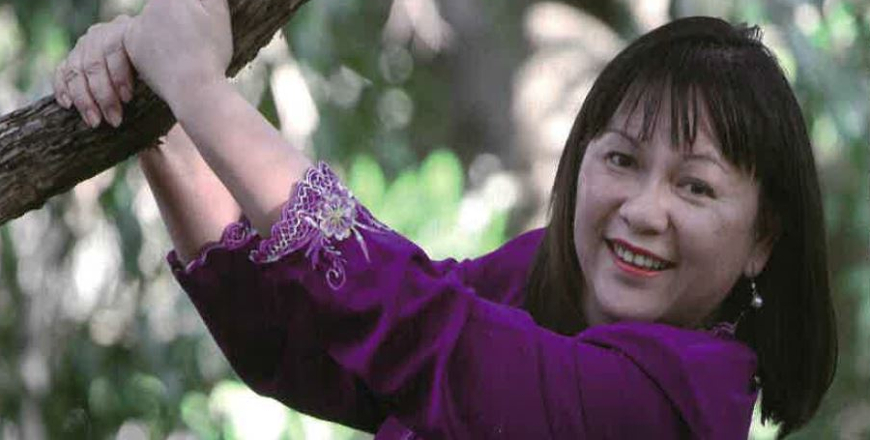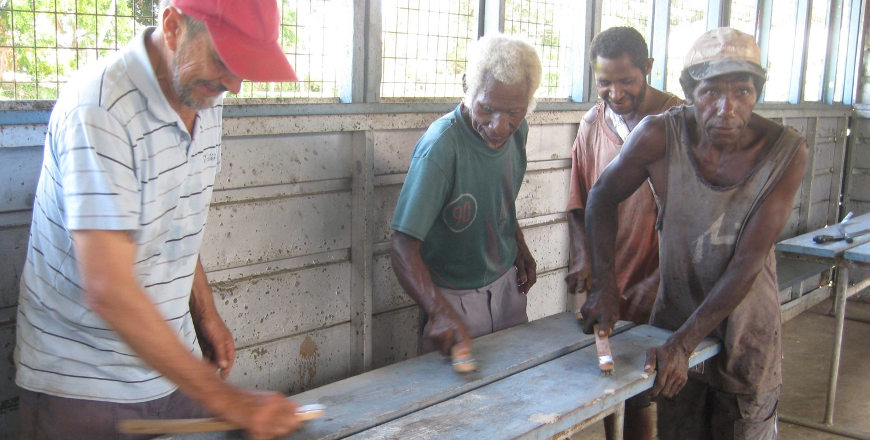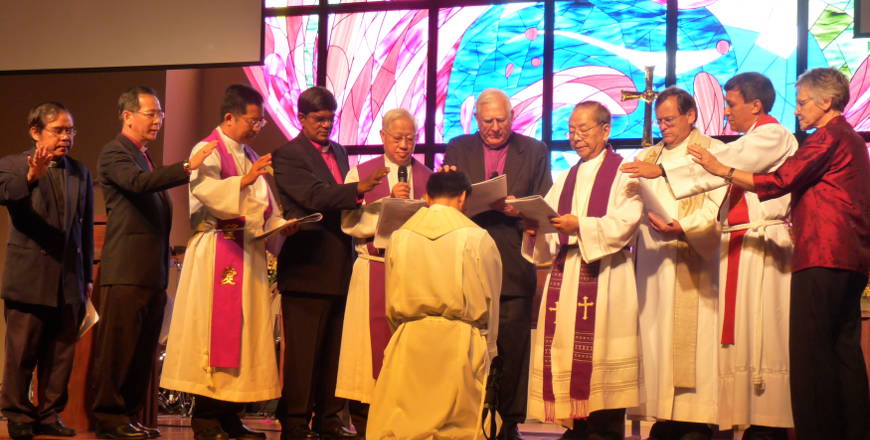the wild woman from borneo
Lively Jess Vun is one of the faces representing new partnerships between the LCA and Asian churches.
‘A lot of my non-Christian friends back home say I am like a cat with nine lives’, says Jess Vun. ‘I always ask God: Why do you try so hard to keep me alive? Why not just let me die?’
Jess has survived more than her fair share of accidents and health problems. So she suspects that God has good reasons for keeping her alive. So she takes up every opportunity as it comes to her, believing that God’s plan for her life will unfold as she follows him in faith.
This is how the lively and effervescent Jess, a civil engineer, last year came to study at Australian Lutheran College (ALC) on a LCA scholarship. Over two years she is completing a Master of Theology specialising in Christian Education.
‘When the scholarship was offered to me, I could only obey God’s call. How could I ignore that I had been chosen by God to do this? So I came here without thinking too much about it.’
Jess had to leave behind in Borneo her husband Frederick Tai, along with other securities and comforts of her life in order to come to study at ALC. ‘Being here is a test of my faith. It is now that I have to truly learn to trust and depend on God.’
Jess is from the Basel Christian Church of Malaysia (BCCM), a partner of the Lutheran Church of Australia. She has long been interested in theological education and in 2007 graduated with a Master of Divinity degree from BCCM’s Sabah Theological Seminary (STS).
‘When I started studying towards the Master of Divinity, it was already clear to me that I would like to be a lecturer in the seminary one day. When Dr Saik from the USA came to STS to teach in Christian Education, she challenged me to pray and seek God’s will about specialising in Christian Education.
‘Not long after that I told Dr Thu (principal of STS) that this was my intention. He told me about the possibility of studying at ALC. So, in a few short months, I graduated from STS, was commissioned by STS – and then suddenly I was living and studying in Australia!’
Jess was born in what was then the British colony of North Borneo (now the state of Sabah in Malaysia). She grew up in the small village of Jesselton (now Kota Kinabalu), where she went to primary and secondary school. In order to pursue higher-education studies, however, she had to move to Kuala Lumpur, where she gained her Diploma of Civil Engineering. She then made a huge climatic leap from the equatorial tropics of Borneo to the cold and cloudy bleakness of Glasgow, Scotland, where she studied towards and gained her Bachelor of Civil Engineering.
Jess’s mother was born in Hong Kong and met and married Jess’s father when she emigrated to North Borneo with her family. Back home Jess’s mother had been a member of the Basel Church (which had been established by German missionaries from Switzerland), and so she joined that church when she arrived in Borneo. Jess, the first of four children, was baptised when she was an infant in the church that is now the STS chapel. ‘Isn’t it marvellous that God destined me for a future with STS even as I was baptised?’, Jess says with a wide grin.
In 1980, when she was 18, Jess had ‘a special and supernatural encounter with God’ while she was praying. ‘I suddenly realised that God is real. I also understood that I am a sinner and that Christ died for me.’
After that, opportunities to serve God opened up for Jess in various churches and countries. ‘God allowed me to see and experience his miraculous works and his power. Glory to God!’
She says that it is a challenge to be a Christian in Malaysia. Under the constitution, all ethnic Malays are Muslim. At the same time Malaysia is a multi-racial and multi-religious society, including Malay, Chinese, Indian and indigenous groups, as well as migrant workers from many parts of Asia and elsewhere. ‘Learning to co-exist with others is extremely difficult, but it is also essential if we are to live and work together peacefully and with respect for each other’, says Jess. ‘Malaysia’s concept of Muhibbah (racial tolerance) is a good starting point. But being tolerant of each other in an endeavour to co-exist peacefully is not enough. We must also learn to understand each other, so that we can respect each other’s religious and cultural boundaries.’
There is also the challenge of how to weave Christianity into the cultural fabric of Asia, where it is still considered a Western religion and thus irrelevant, unnecessary and even imperialistic.
‘Christianity came to Asia showing no mercy’, says Jess. ‘The missionaries considered all Asian religions to be pagan and unholy. They came from a position of power and showed very little cultural sensitivity to the local people. The anti-Christian feelings have stuck, which probably explains why Christianity is still very much a minority religion in Asia.
‘I have friends who were thrown out of their family home when they became a Christian’.
Another challenge for Christians in Asia is determining how to present the ‘complete gospel of God’ in a pluralistic society ‘where there are many choices of religion’.
‘Should we perform lots of miracles, as the Charismatic churches do, so that we can demonstrate that God is more powerful than all the other gods? Or should we take on a more prophetic approach and do charitable and community works in order to show to people the passionate and suffering Christ, who loves the marginalised, the poor and the deprived? Or should we simply preach the pure gospel and do nothing else, believing that God’s work will be done through the power of the word alone?
‘These are just some of the questions and challenges confronting every person who responds to the call of God to take the gospel to Asia.’
One of Jess’s mentors in Christian Education is Rev Dr Thu En Yu, principal of STS. ‘Dr Thu is a man with great vision, a heart for God and also for the people of Sabah. He is open and very ecumenical. I think that because of his obedience to God he has been given great insights for the church and the seminary. I am greatly inspired by his vision.’
When she returns to Sabah, Jess plans to teach Christian Education at STS, as well as help the Christian community to develop effective Christian educational ministries. She also hopes to establish a creative arts department in STS that will specialise in using creative arts as instruments for worship and teaching.
Jess has many plans. She is not one to idly watch the world go by. ‘I want to live a full life while I am here in this world, a life full of experiences and adventures. I always try to explore new things, territories and dimensions. I never like to live a life just like others. I remember someone once said, “Because I am nothing, I can do anything”.
‘There are still a lot of things that I have not yet explored, places I have not yet visited. So I always like to keep a curious heart and always want to learn new things in order to live a full life.
‘God is my source of energy and inspiration. I talk to him and most of the time wrestle with him. For instance, when I read Psalm 8 (one of my favourite sections of the Bible), I wonder why God has chosen us humans for his purpose. “You have given them dominion over the works of your hands; you have put all things under their feet” (v6).
‘This verse reminds me that we humans are responsible for what happens in the world. We are the ones who have God-given capacity to make a difference for good. In fact, that is what I want written on my tombstone: “One who made a difference”.
‘So, while I still live and as God gives me opportunities, there is lots to be done for God!’
If you would like to know more about opportunities to personally support a scholarship recipient in your congregation during their stay in Australia, or ways in which you can financially and prayerfully support LCA International Mission’s scholarship program, you are invited to phone Nevin on (08) 8267 7300 or email nevin.nitschke@lca.org.au
Read more stories about LCA International Mission scholarships at http://www.lcamission.org.au/category/stories/scholarships/




